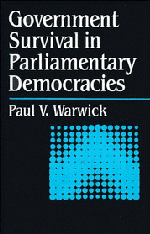Book contents
- Frontmatter
- Contents
- List of tables and figures
- Preface
- GOVERNMENT SURVIVAL IN PARLIAMENTARY DEMOCRACIES
- 1 Introduction: the government survival debates
- 2 The quantitative study of government survival
- 3 Basic attributes and government survival
- 4 The role of ideology
- 5 Economic conditions and government survival
- 6 The underlying trend in government survival
- 7 Model adequacy
- 8 Conclusion: an alternative perspective on government survival
- Appendix: a codebook of variables used in this study
- Notes
- References
- Index
5 - Economic conditions and government survival
Published online by Cambridge University Press: 19 September 2009
- Frontmatter
- Contents
- List of tables and figures
- Preface
- GOVERNMENT SURVIVAL IN PARLIAMENTARY DEMOCRACIES
- 1 Introduction: the government survival debates
- 2 The quantitative study of government survival
- 3 Basic attributes and government survival
- 4 The role of ideology
- 5 Economic conditions and government survival
- 6 The underlying trend in government survival
- 7 Model adequacy
- 8 Conclusion: an alternative perspective on government survival
- Appendix: a codebook of variables used in this study
- Notes
- References
- Index
Summary
The tendency to seek the causes of government survival in the attributes of governments or their parliamentary environments, which characterizes the past two chapters as well as most previous empirical work, implies a static perspective on the topic. Changes in these kinds of attributes affect the survival of governments only in a comparative static sense – by altering the predicted survival rate for a government as a whole. What is excluded is the possibility that the hazard rate of any one government may vary over time in accordance with changes in other factors.
A prime candidate for a dynamic influence on government survival is the evolving state of the economy. In the period since 1945, citizens of West European polities have come to expect their governments to manage economic affairs so as to assure high levels of employment and reasonable price stability; most elections, in consequence, have the state of the economy as their main issue. Although government survival in parliamentary regimes depends more often on parliamentarians than voters, it may be expected that parliamentary support for governments also varies with the economic conditions that seem to matter so much to the public – after all, parliamentarians are responsible to their electorates in the final analysis.
Despite the very considerable attention devoted to associating economic conditions with government standings in opinion polls or with electoral outcomes (Paldam 1981; Lewis-Beck 1988), the related question of how the economy affects government survival has only rarely been tackled.
- Type
- Chapter
- Information
- Government Survival in Parliamentary Democracies , pp. 75 - 93Publisher: Cambridge University PressPrint publication year: 1995



